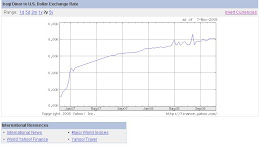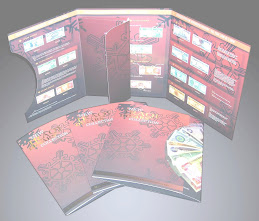The Central Bank of Iraq is Raising the Value of Dinar Gradually
The volume of total demand for the dollar declined at the sessions of Iraqi Central Bank last week, to close at $ 655 million, compared with more than 796 million achieved in the previous week, while the exchange rate had stabilized at 1172 dinars to the dollar.The Consultant at the Iraqi central bank, Mudhir Mohamed Saleh, said that the bank's policy in its auction for the sale of foreign currencies, "focus on stabilizing the exchange rate and strengthen the Iraqi dinar against the dollar, to face inflationary pressures which in our view that the exchange rate the most important". It is the policy of the central bank to raise the value of dinar gradually.
The average daily demand increased last week at 163.8 million dollars, which is higher than the highest rates achieved in the last period, as the third quarter of this year, the rate of 150 million dollars at each session.
The Central Bank of Iraq "reduced the interest rate to 14 percent rather than 15 percent".
( Iraq Directory )
Ulasan Singkat dari Paragraf Utama :
The Consultant at the Iraqi central bank, Mudhir Mohamed Saleh, said that the bank's policy in its auction for the sale of foreign currencies, "focus on stabilizing the exchange rate and strengthen the Iraqi dinar against the dollar, to face inflationary pressures which in our view that the exchange rate the most important". It is the policy of the central bank to raise the value of dinar gradually.
Kurang lebih kalau saya terjemahkan secara bebas adalah sebagai berikut :
Bank Sentral Iraq Meningkatkan Nilai Dinar Secara Bertahap
Konsultan Bank Sentral Iraq, Mudhir Mohamed Saleh, menyatakan bahwa kebijakan bank dalam lelangnya untuk Penjualan Valuta Asing, "Fokus dalam menstabilkan nilai tukar dan memperkuat Dinar Iraq terhadap dollar untuk menghadapi tekanan inflasi dimana menurut kami bahwa memperkuat nilai tukar Dinar Iraq adalah hal yang paling penting".
Adalah kebijakan Bank Sentral Iraq untuk meningkatkan nilai Dinar Iraq secara bertahap.
( Iraq Directory, 4 January 2009 )
Analisa dari saya :
Iraq sebagai negara Net Importir (negara yang memiliki ketergantungan yang sangat besar terhadap barang impor sehingga hampir seluruh kebutuhannya di impor).
Hampir semua barang yang di impor mereka bayar dengan mata uang dollar.
Kalau nilai mata uang dinar melemah terhadap dollar maka yang terjadi didalam negeri adalah inflasi / melambungnya harga barang dipasaran yang menyebabkan warga miskin & penderitaan semakin bertambah.
Dan kalau nilai mata uang dinar menguat terhadap dollar maka yang terjadi didalam negeri adalah tekanan inflasi akan berkurang.
Itulah mengapa Iraq menggenjot Ekspor minyaknya semaksimal mungkin.
Karena minyaknya dibayar dengan $.
Dan hampir satu2nya cara adalah dengan mengekspor minyak sebagai sumber devisa terbesar & membuat cadangan devisa mereka dalam bentuk US$ berlimpah.
Dengan demikian nilai US$ diharapkan akan melemah karena oversupply.
Namun demikian Pemerintahan Iraq tidak perlu khawatir dengan Cadangan Minyaknya yang terbukti no 3 terbesar di dunia. Itu yang membuat kita semua optimis bahwa Nilai Mata Uang Dinar Iraq akan bisa kembali seperti sedia kala atau minimal sama dengan nilai Dollar.
Yang kita harapkan agar semua itu bisa terjadi adalah Kedamaian sejati di iraq agar Iraq bisa membangun kembali bangsanya & yang paing penting Iraq dapat terus menjaga keamanan produksi minyaknya sehingga bisa terus menghasilkan dollar untuk memperkuat nilai mata uang yang mereka miliki.
Demikian analisa fundamental ekonomi Iraq secara Makro yang bisa saya sampaikan. Terima kasih.
Ibu Ita Arianto. (PH. 081330893103)
http://importir-dinar-iraq.blogspot.com
email: ummu_harits@yahoo.co.id

